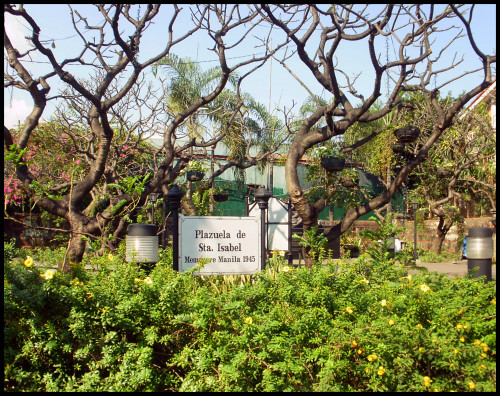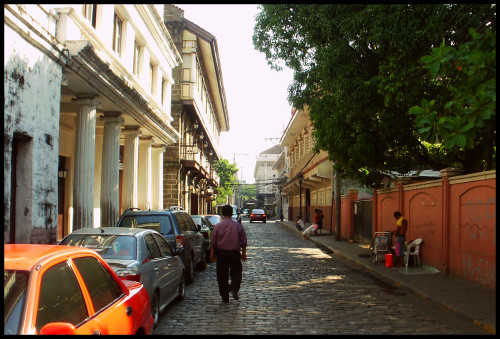It's feeling like a movie out here in Manila; a bad movie. Just recently, our help, Lisa, came back to the house from a trip to Mercury Drug weeping. Her cell phone had been stolen. Two masked men on a motorcycle had come up to her at Labo, the stretch between Laong Laan and Maria Clara, and threatened to kill her with I forget what the weapon was: a gun or a balisong? It doesn't matter. "I'm concerned about my SIM," she said. "I saved so many numbers and messages in there." We told her it doesn't matter, at least you have another cell phone, a nice new and shiny red one with a TV. She bought it from Robinsons Place Manila a couple of months earlier. It's a better phone than mine; mine has a touchscreen that doesn't do anything when you touch it.
Then a few days ago my younger brother, Josemaria, came home from work swearing he'd never ride a jeepney again. He began talking about how, earlier that morning, after six but before seven, he had closely watched a pickpocket slip inside the EDSA-Cubao jeep he was in and steal another passenger's cell phone. He said that the poor passenger must have been a construction worker, he looked so sleepy, he had no idea what was happening. I told Josemaria to ride a taxi or a Tamaraw FX. "There aren't any FXs that early," he insisted. I didn't believe him. I said I used to ride FXs to Cubao every day when I was working at Eastwood. He said again, "There aren't any FXs that early."
Even if there were FXs, or even if he began taking taxis on his way to the office, I'd still fear for his safety. Lately there has been plenty of news on television about the bukas-taxi boys, whose modus operandi is to open the unlocked passenger doors of taxis running along EDSA and seize whatever they can seize from whoever's at the backseat. Should the victim or the driver jump out in the middle of traffic and chase after them, the boys—children, really—will pick up rocks from the sidewalk for throwing. Then they'll run across the rails of the MRT to the other side of the road.
It's really kind of messed up. It doesn't even matter to these thieves whether you have cash in your pocket or not, or a credit card in your wallet or not: whatever you have with you, they're going to take it away. Yesterday morning I woke up to find that the water meter by the gate of our house was gone. I remembered the dog barking in the middle of the night, but who would have thought it was at someone trying to make a living out of selling stolen brass?
Actually, I should've known. There are enough stories in this city about the disappearance of the side mirrors of parked cars. There are enough stories about vanishing handbags and purses in food courts, about laptops lost in Starbucks. Last year, when we lost the ancestral house to a big fire, a number of men in firefighting suits went in without hoses and opened drawers and boxes and cabinets, looking for jewelry. A few days later came the scavengers, who searched the rubble for scraps of steel and crumpled iron sheets. There was this case too from last month, when, filing out of a Rise of the Planet of the Apes screening, I noticed an edgy little twenty-something guy in cargo denim place a blue Jansport backpack at my feet. I thought it contained a bomb, so I ran like an idiot to the houseware section, behind a mall security guard. It was only when I heard the crunchy obscenities of the thief's victim that I realized the bag was not about to explode.
Theft happens everywhere, but this is getting seriously stupid. I won't even call it theft. My name for it is despair: a state of being, of thinking, of feeling rather than an act of crime. And while there's little to be said about stealing—other than it's not right, and should be stopped—it worries me what might be said about what's being stolen, and why. I feel often enough like hell for being unable to make a lot of money (although I do seem to consistently spend more than what I make), but scenes of scheming out-of-school youth and water meter pilferage leave evidence not of sullen personal defeat (or kleptomaniac tendencies) but of larger disorders and societal failures. It's not a problem you can solve by chasing.
It's also not a problem you can solve by policing. When I was seven or eight years old, I stole a box of chewing gum: Chiclets. I grabbed it from the checkout counter at the grocery store in Welcome Rotonda and put it in my pocket. It felt so illegal. And it tasted even worse. The gum was disgusting because it came with a special ingredient called conscience. It certainly wasn't worth it, and if security had come after me, if my mother had caught me and told me off for taking things that belonged to someone else, I'd have given it back, even wrapped it in teary-eyed apology. I'm not saying there weren't more serious cases of theft back then, but these days one gets the sense of a new breed of thieves: those who would literally die if they ever had to say sorry; those who will not only refuse to give your belongings back, but who will also threaten you with a fan knife and hurl a big-ass rock through your windshield—hurl it, too, with all the force of their pain. And, by God, they must be hurting: conscience and punishment count as nothing more than a pinprick compared to despair.
It's like a movie, I'm telling you: some sort of poverty porn, with the state at the directorial helm and society as its writers. I believe we all know who the actors are; they're sweeping up all the hardware.


